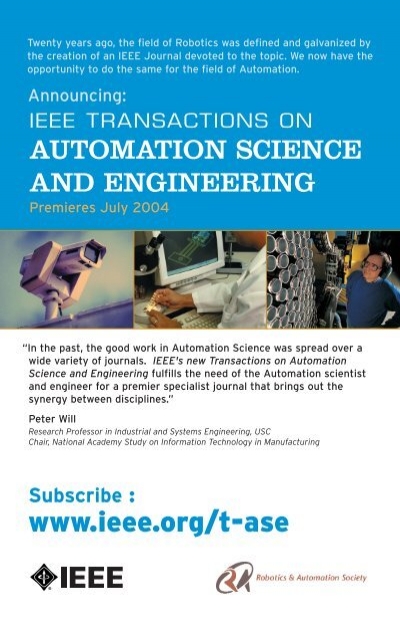Estimation and Detection of Intermittent Faults for Nonlinear Systems Disturbed by Noises With Uncertain Covariances
IF 6.4
2区 计算机科学
Q1 AUTOMATION & CONTROL SYSTEMS
IEEE Transactions on Automation Science and Engineering
Pub Date : 2025-09-26
DOI:10.1109/TASE.2025.3614648
引用次数: 0
Abstract
In this paper, the problems of intermittent fault (IF) estimation and detection are investigated for stochastic nonlinear systems disturbed by noises with uncertain covariances. The research methodology begins with the transformation of conventional nonlinear systems into descriptor systems through state and fault augmentation. For IF estimation, an innovative moving horizon estimator is introduced by utilizing the variational Bayesian technique. This approach enables the simultaneous and iterative estimation of both IFs and noise covariance matrices through the strategic selection of appropriate conjugate prior distributions. Furthermore, a rigorous analysis is conducted on the statistical properties of the estimation outcomes, leading to the development of an IF detection framework based on Hotelling’s受不确定协方差噪声干扰的非线性系统间歇故障的估计与检测
研究了受不确定协方差噪声干扰的随机非线性系统的间歇故障估计和检测问题。研究方法从通过状态和故障增广将传统非线性系统转化为广义系统开始。在中频估计中,利用变分贝叶斯技术引入了一种新颖的移动视界估计方法。这种方法通过选择合适的共轭先验分布,可以同时和迭代地估计if和噪声协方差矩阵。此外,对估计结果的统计特性进行了严格的分析,从而开发了基于Hotelling的$T^{2}$统计量的中频检测框架。为了验证所提出方法的有效性,在旋转导向钻井工具系统上进行了大量的实验评估,证明了我们的算法在实际应用中的优越性能。从业人员注意:近几十年来,间歇性故障(if)已经成为多个工业部门的关键安全挑战,特别是在航空航天系统和电子基础设施中。影响因素的出现和消失时间的精确检测是确保工业安全的重要要求。依赖截断残差的传统方法在实际应用中经常表现出明显的局限性,主要是由于它们在处理非线性动态行为和统计模糊噪声剖面方面的能力不足。为了解决这些问题,针对噪声协方差矩阵不确定的非线性系统,设计了一种自适应移动地平线估计框架。利用估计结果,开发了一种新的检测方法来准确识别干扰素的出现和消失。通过比较案例研究的实验验证证明了所提出方法的操作可行性和检测效率,为行业从业者提供了一个可靠的工具,以提高受if影响系统的操作可靠性。
本文章由计算机程序翻译,如有差异,请以英文原文为准。
求助全文
约1分钟内获得全文
求助全文
来源期刊

IEEE Transactions on Automation Science and Engineering
工程技术-自动化与控制系统
CiteScore
12.50
自引率
14.30%
发文量
404
审稿时长
3.0 months
期刊介绍:
The IEEE Transactions on Automation Science and Engineering (T-ASE) publishes fundamental papers on Automation, emphasizing scientific results that advance efficiency, quality, productivity, and reliability. T-ASE encourages interdisciplinary approaches from computer science, control systems, electrical engineering, mathematics, mechanical engineering, operations research, and other fields. T-ASE welcomes results relevant to industries such as agriculture, biotechnology, healthcare, home automation, maintenance, manufacturing, pharmaceuticals, retail, security, service, supply chains, and transportation. T-ASE addresses a research community willing to integrate knowledge across disciplines and industries. For this purpose, each paper includes a Note to Practitioners that summarizes how its results can be applied or how they might be extended to apply in practice.
 求助内容:
求助内容: 应助结果提醒方式:
应助结果提醒方式:


